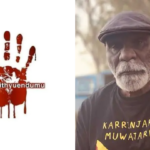Human Rights Lawyer Slams NT Chief Minister’s “Regressive” Attack on Territory’s Coroner

A human rights lawyer well-versed in representing the families of Aboriginal individuals who’ve died in the custody of police or corrections at their coronial inquests has condemned the Northern Territory government’s initial response to the damning assessment of the NT Police Force that the recent inquest into the police killing of Warlpiri Luritja teen Kumanjayi Walker as “legally regressive”.
NT coroner Elisabeth Armitage released her findings into the 19 November 2019 police killing of Walker by then NT police constable Zachary Rolfe on 7 July 2025. The findings of the report were not only shocking due to details revealing the all-pervasive institutional racism of the NT police, but also because the coroner dared to be so brutally honest in her truth-telling about justice in the Territory.
Armitage’s assessment left NT chief minister Lia Finocchiaro speechless for days on end. Taking office in August 2024, Finocchiaro’s Country Liberal ministry has since been on a law-and-order drive, which predominately targets First Nations and in particular, their youth. Indeed, after close to a year of rolling out ever-increasing tough-on-crime measures, the report poses a threat to this momentum.
After a fortnight of silence from the NT chief minister, who is also NT police minister, Finocchiaro played a Trumpian card, as she told Mix FM on 21 July, that she considers the Walker inquest dragged on too long and cost too much, so she is now calling for an overhaul of the Coroners Act 1993 (NT), which was a brazen move in the face of a report that condemned NT police from top to bottom.
National Justice Project director George Newhouse is the lawyer crying foul over the fact that Finocchiaro has failed to mention the over 30 comprehensive recommendations Armitage made in her report and has rather chosen to initially attack the institution of the NT coroner itself, as the legal professional warns this backward act undermines long-term progress towards justice.
Silencing the messenger
“Any plan to undermine the coroner is not just dangerous, it is legally regressive, morally indefensible, and in direct conflict with the lessons Australia promised to learn from the Royal Commission into Aboriginal Deaths in Custody nearly 35 years ago,” said Newhouse, in a piece he penned for The Northern Myth website.
“Initial responses to the Kumanjayi Walker findings and recommendations suggest that the NT government wants to turn away from the uncomfortable truths about how First Nations people are treated by institutions, like the police, that should be free from discrimination,” he added.
“We must be on guard to ensure that decades of lifesaving reforms are not undone by the proposed amendments, putting lives at risk.”
Newhouse stresses that the “care and thoroughness” that Armitage to took produce the Kumanjayi Walker coronial report. He notes that she “exposed deep cultural failings, operational misconduct and embedded racism within the NT police”. However, while NT police has since agreed to implement an antiracism policy, Finocchiaro “has responded with deflection and distraction”.
Sydney Criminal Lawyers has been tracking the Finocchiaro government since it came to power, as it’s been passing one draconian law-and-order bill after enough, which has resulted in around 40 Aboriginal people being taken into custody on a daily basis, has ensured that more adults and youths are being denied bail and held in prison on remand, and this all appears to plan.
“What the NT government is proposing must not roll back three decades of institutional change, born out of the 1991 Royal Commission into Aboriginal Deaths in Custody,” Newhouse underscored. “That Royal Commission made it clear: coroners should do more than identify the cause of death.”
Not perfect but improving
The jurisdiction of the Northern Territory has a much larger portion of its population made up of First Peoples than anywhere else on the continent. Thirty percent of the NT populace is Aboriginal, and in settler colonial Australia, this goes a long way to explaining why the debilitatingly racist NT police is so excessively violent and repressive.
Eighty eight percent of the adult prisoner population in the NT was made up of Aboriginal people in the March quarter this year, while Indigenous youth always account for at least 90 percent of the child prisoner population in the Territory.
Newhouse explains that despite the glaring injustices that Armitage has identified, the fact of the matter is that the coronial process that Finocchiaro has taken aim at has resulted in concrete justice outcomes since the Royal Commission recommended that coronial powers be expanded and this took place over the 1990s. And the solicitor warns that any attempt to curtail them is “dangerous”.
The NJP director has represented many high profile Aboriginal deaths in custody and police excessive use of force cases over the last decades, so he’s well aware that the enhanced mandate of coroners across the continent has not been merely symbolic, but it has been essential in bringing about real tangible just outcomes for families, which would not have been the case prior to the reforms.
About two dozen of the 339 recommendations the Royal Commission handed down in April 1991, refer to the coroner. The report resulted in it being a requirement that whenever a custody death in an inquest must follow. Such a death occurs when a person dies whilst being detained by police or corrections, as well as a result of police or corrections attempting to detain or preventing escape.
According to Newhouse, the reforms resulted in coroners assessing “circumstances surrounding a death and for comment on the quality of care, treatment and supervision of people who died in custody”.
The lawyer also provides examples of cases, in which “coroners have used their powers responsibly to expose systemic failures and make recommendations to try to make change”, which include XY, a First Nations child in Victorian state care, Naomi Williams, Dougie Hampson, Veronica Nelson, Mona Lisa and Cindy Smith, along with Kumanjayi Walker.
Federal intervention required
Another thoroughly disturbing aspect to Finocchiaro’s suggestion that coronial powers are weakened, Newhouse points out, is that he’s the lawyer representing the family of Kumanjayi White, another Warlpiri man, who was recently killed at the hands of NT police in questionable circumstances, and the NT chief minister’s toying around with the Corners Act could affect this case.
Armitage’s delivery of her report had to be delayed because of the 27 May 2025 police killing of White in a supermarket in Mparntwe-Alice Springs. White was a man with disabilities, who evidently got into a dispute with shop security about an alleged attempt to steal food, prior to two plainclothes officers taking over and restraining the man to death.
Restraint to death is a common death in custody scenario, which often involves the victim calling out that they cannot breathe, prior to officers ensuring that breathing ceases completely.
“If the Northern Territory government refuses to uphold the principles set out by the Royal Commission, then responsibility must shift,” Newhouse further makes clear in his piece. “Fortunately, our Constitution provides a way to intervene: section 122 gives the federal parliament full authority over territories. The Commonwealth can override NT laws whenever it chooses.”
The NT government passed the Rights of the Terminally Ill Act 1995 (NT), which made it the first jurisdiction globally to enable a terminally ill patient to end their own life with medical assistance. However, conservative forces in Canberra on both sides of the political divide were against the reforms and the federal government passed the Euthanasia Laws Act 1997 (Cth) to repeal the policy.
The lawyer is now calling on the Albanese government to intervene in the matter related to the NT coroner and he’s calling on federal Labor to act immediately, rather than wait for Finocchiaro to progress her ideas any further.
“The need to intervene is particularly pertinent in response to a broader pattern of regressive and punitive legislative interventions in the NT,” Newhouse made clear. “A suite of laws, many of which undermine human rights, including the rights of children and First Nations peoples, have already been pushed through the NT parliament, despite significant community and expert opposition.”
“These include laws that disproportionately affect Aboriginal communities, raising serious concerns under both community expectations and international human rights frameworks,” he said in conclusion.







